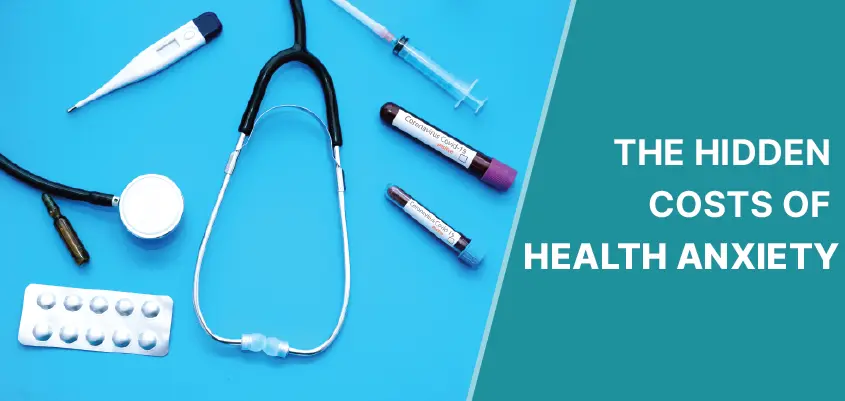Introduction
Are you always worried about your health? Do you fear catching an infection or falling sick? It’s possible that you have health anxiety if you said yes to both questions. You can go through health anxiety if you have gone through a severe illness personally or seen someone go through one in your life. Even childhood abuse can be one of the reasons. In this article, let me help you understand the symptoms and how you can manage this anxiety in the long term.
“After obsessively Googling symptoms for four hours, I discovered ‘obsessively Googling symptoms’ is a symptom of hypochondria.” – Stephen Colbert [1]
What is Health Anxiety?
We all worry at some point in our lives about our loved ones, about the future, and even about health. Specifically, post the pandemic, we have all started taking better care of ourselves. However, there are a few people who over-worry and become anxious at the thought of an illness. This psychological condition is called ‘Health Anxiety,’ also known as Illness Anxiety Disorder or Hypochondriasis [2].
If you are one such person, then it’s possible that if you have some kind of bodily sensation also, you might think of it as a sign of severe illness. You might constantly visit a doctor to confirm if your doubt is real or not [3]. If you have seen the show ‘Big Bang Theory,’ then you probably remember Sheldon Cooper from the show, who knew everything about every disease in the world and was scared of even being in the same room as someone if they so much as sneezed.
What are the Physical and Emotional Symptoms of Health Anxiety?
If you are someone who has health anxiety, you might worry about getting different illnesses at different times. However, the symptoms may be constant:
Physical Symptoms: As someone with health anxiety, you can observe the following physical symptoms [4]:
- Heart palpitations
- Muscle Rigidity
- Feeling faintish and dizzy
- Frequent Headaches
- Shortness of Breath
- Stomach-related issues
- Feeling fatigued
- Sweating Profusely
Emotional Symptoms: Health anxiety is also linked with a few emotional symptoms [5]:
- Worrying Excessively
- Fear
- Restlessness
- Irritability
- Difficulty in concentrating
- Sleep issues
- Over-Analyzing Every Sensation in Your Body
- Anxiety
- Depression
- Body Aches and Pains
- Isolated Socially
Apart from these symptoms, if you are facing the following, then also you might have health anxiety [6]:
- You think a lot about having a serious illness
- You try out different doctors so that you can find that one doctor who agrees with your self-diagnosis.
- You get a lot of medical tests done even though your doctor did not ask for them
- You talk a lot about health with your friends and family
- You spend hours googling your symptoms
When to Seek Professional Help for Health Anxiety?
You can ask for help from a professional if you feel that you need it. However, it’s most important to do that when you are not able to perform your daily activities also properly. Also, if any of the following issues come up [7]:

- Persistence and Intensity of Symptoms: First of all, you need to check on the symptoms of health anxiety. If you feel that these symptoms have existed for a long time or they have possibly become worse over time, then you need to meet a professional.
- Impaired Functioning: If the symptoms of health anxiety that you are facing have started getting in the way of your normal day-to-day activities, it would be good to get help from a doctor. Plus, if you feel you have started disconnecting from people socially, then you can also get help.
- Negative Impact on Well-being: If you start feeling distressed because of your concerns, then you should meet a doctor and get clarity. Plus, if you start facing any symptoms of anxiety and depression, then do seek professional health. Also, you can meet your doctor if, in general, you start feeling a lack of overall well-being.
- Inability to Self-Manage: If you have already tried doing everything in terms of self-care or changing lifestyle habits, then go ahead and meet a healthcare professional.
What Can You Do to Manage Health Anxiety?
As hard as it might seem, you can manage your health anxiety. You can try the following strategies [8]:

- Education and Information: Start by getting the correct information about your health conditions and medical procedures. That way, you can challenge even your own thoughts that mislead you toward worrying excessively. Plus, you can get rid of the anxiety you’re facing.
- Cognitive-Behavioral Therapy (CBT): If you visit a psychologist, they may use CBT to help you with your health anxiety. Since this therapy helps you to identify and challenge your thoughts and beliefs, you can actually get rid of all your worries and fears in an effective way.
- Mindfulness-Based Interventions: You can even practice being in the present through mindfulness-based techniques like meditation. That way, you can stop judging your own thoughts and start accepting that the bodily sensations are just normal sensations.
- Gradual Exposure and Response Prevention: So, let’s say you have a fear of hospitals because of the germs that they might have around. So, your doctor or psychologist can use this technique to gradually expose you to your fear, which is the hospital, stop you from having your usual response, and guide you toward another, more relaxing thought.
- Stress Reduction Techniques: You can even make use of techniques that can help you in reducing your stress levels. You can add exercises, breath control, relaxation exercises, etc., to your daily routine.
Conclusion
Everyone wants to have excellent health at all times. After all, when we are well and feel well, we are able to perform better in life. So, having health anxiety can make you stop everything that you do or are capable of doing. It can impact all areas of your life. Thus, if you feel that you are facing health anxiety, then you first need to try practicing certain strategies on your own, like mindfulness, stress-reduction exercises, etc. If you are still not able to overcome your issues, take professional health. You don’t have to face anything alone. You and your health are important. So, take all the help you need.
If you are facing health anxiety, reach out to our mental health experts at United We Care! At United We Care, a team of wellness professionals and mental health experts will guide you with the best methods for well-being.
References
[1] Colbert, S. (n.d.). Quote by Stephen Colbert: “After obsessively Googling symptoms for four ho…” Goodreads. Retrieved May 15, 2023, from https://www.goodreads.com/quotes/604967-after-obsessively-googling-symptoms-for-four-hours-i-discovered-obsessively
[2] P. M. SALKOVSKIS, K. A. RIMES, H. M. C. WARWICK, and D. M. CLARK, “The Health Anxiety Inventory: development and validation of scales for the measurement of health anxiety and hypochondriasis,” Psychological Medicine, vol. 32, no. 05, Jul. 2002, doi: 10.1017/s0033291702005822.
[3] N. M. Alberts, H. D. Hadjistavropoulos, S. L. Jones, and D. Sharpe, “The Short Health Anxiety Inventory: A systematic review and meta-analysis,” Journal of Anxiety Disorders, vol. 27, no. 1, pp. 68–78, Jan. 2013, doi: 10.1016/j.janxdis.2012.10.009.
[4] S. Taylor, K. L. Jang, M. B. Stein, and G. J. G. Asmundson, “A Behavioral-Genetic Analysis of Health Anxiety: Implications for the Cognitive-Behavioral Model of Hypochondriasis,” Journal of Cognitive Psychotherapy, vol. 22, no. 2, pp. 143–153, Jun. 2008, doi: 10.1891/0889-8391.22.2.143.
[5] “IFC,” Journal of Anxiety Disorders, vol. 18, no. 3, p. IFC, Jan. 2004, doi: 10.1016/s0887-6185(04)00026-x.
[6] “Hypochondria,” meaning, symptoms and treatment | healthdirect. https://www.healthdirect.gov.au/hypochondria
[7] J. S. Abramowitz, B. J. Deacon, and D. P. Valentiner, “The Short Health Anxiety Inventory: Psychometric Properties and Construct Validity in a Non-clinical Sample,” Cognitive Therapy and Research, vol. 31, no. 6, pp. 871–883, Feb. 2007, doi: 10.1007/s10608-006-9058-1.
[8] B. O. Olatunji, B. J. Deacon, and J. S. Abramowitz, “The Cruelest Cure? Ethical Issues in the Implementation of Exposure-Based Treatments,” Cognitive and Behavioral Practice, vol. 16, no. 2, pp. 172–180, May 2009, doi: 10.1016/j.cbpra.2008.07.003.










